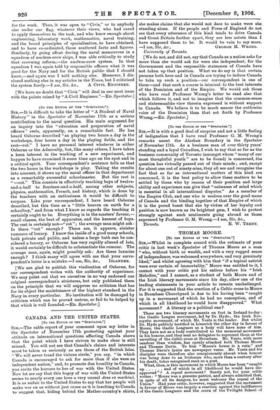[TO THE EDITOR OF THE " SPECTATOR." j SIR,—It is
difficult to take the letter of "A Student of Naval History" in the Spectator of November 17th as a serious contribution to the naval question. His main argument for an inquiry into the "education and preparation of naval officers" rests, apparently, on a remarkable fact. He has beard Osborne described "as playing two hours a day in the workshops, four hours a day in the playing fields, and the rest—rot." I have no personal interest whatever in either Osborne or the Admiralty, but, like many others, I have taken a keen interest in the working of a new experiment, and happen to have examined it some time ago on the spot and in a critical spirit. Your correspondent's sentence tells us that the two hours in the workshops is play. Taking the results into account, it shows up the naval officer in that department as a remarkably successful schoolmaster. But the rest is "—rot." This consists in effectively teaching boys of twelve- and-a-half to fourteen-and-a-half, among other subjects, physics, mathematics, French, and history, which is done by the teachers with an enthusiasm it would be difficult to surpass. Like your correspondent, I have heard Osborne described, but this time as a "little heaven on earth for a schoolboy," and from what I know as regards the teaching it certainly ought to be. Everything is in the masters' favour,— small classes, the best of apparatus, and the keenest of boys. The rest is certainly not—" rot "; the average man might ask : Is there " rot " enough ? There are, it appears, sinister rumours of luxury. I know the inside of a good many schools, both private and public, and unless a large bath can be con- sidered a luxury, or Osborne has very rapidly altered of late, it would certainly be difficult to substantiate the rumour. The average man, again, might possibly ask : Are these luxuries enough ? I think many will agree with me that your cone- pondent's letter is a mistake.—I am, Sir, &c., ISLANDER.
[We are glad to publish this vindication of Osborne, for our correspondent writes with the authority of experience. We may point out that we ourselves in no way endorsed our original correspondent's strictures, but only published them on the principle that we will suppress no criticism that has for its object the maintenance of the highest standard in the Navy in every particular. No institution will be damaged by criticism which can be proved untrue, or fail to be helped by that which is well founded.—En. Spectator.]


























































 Previous page
Previous page